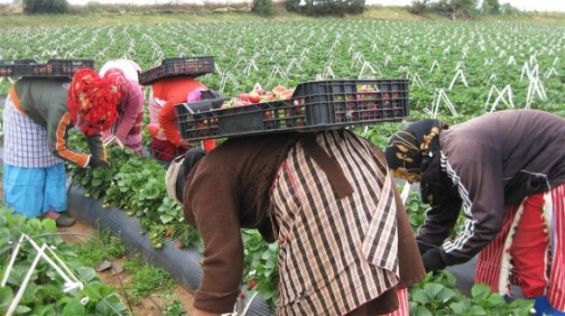In Huelva, hundreds of Moroccan strawberry pickers have decided to break their silence and expose labor and sexual abuses they are subjected to while in the farms. Helped by the Andalusia Workers Syndicate (SAT), some of them filed complaints against their alleged aggressors, creating their own #MeToo movement.
On Sunday, 17th of June, hundreds of them will take their anger to the streets of Huelva to denounce the abusing practices some of them have been targeted with.
While in Spain actions are taken to act on the scandal, voices in Morocco are struggling to be heard.
«We are currently drafting an open letter that will be sent to the Interior and Justice Ministers regarding workplace violence against women», Saida Idrissi, head of the Democratic Association of Women in Morocco (ADFM) told Yabiladi Tuesday.
Farm-workers in Morocco
The association’s letter is to cover the situation of Huelva’s farm workers, according to Idrissi who was more preoccupied by the women working in similar farms in Southern Morocco.
«Hopefully in Spain there is a law that protects these women and the Spanish authorities have reacted to the abuses and arrests were made», argued the activist, adding that «in Morocco, however, the situation is worsening and nothing has been done to stop abusive practices in the farms».
For Saida Idrissi these abuses have been «documented by associations present there and elsewhere in the Kingdom but unfortunately nothing changed».
The activist regretted the way the government dealt with the scandal, indicating that «Spain has given Morocco an example to learn from».
«The authorities, associations, trade unions and even political parties have been galvanized to help these women while in Morocco nothing has been done».
The Moroccan authorities' response
The same opinion was shared by Ahmad Al Haij, president of the Moroccan Association for Human Rights (AMDH). «At first the ministry ignored the situation and later admitted that indeed there were assaults and abuses», he told Yabiladi.
«We are used to these kinds of responses. Every time there is a problem that involves Morocco, the Ministry's classical responses are released to deny everything».
For Al Haij the Moroccan government «shoulder its responsibilities especially as these farm workers are sent through a program signed with the Spanish authorities».
AMDH is going to issue a communiqué, denouncing the working conditions in which Moroccan women work in Huelva and signaling the abuses.
But meanwhile, the association which has an office in Madrid remains helpless in front of the developments that occur every day regarding the Moroccan strawberry pickers.
«For the moment we are in touch with several associations in the North and abroad but the load and nature of our job here in Morocco has stopped us from following every single case equally», indicated Al Haij.
The AMDH president was grateful that Spanish NGOs and syndicates are closely assisting the victims and protecting their rights.
An international law to stop violence against women
On the other hand, founder of Mobilizing for Rights Associates (MRA) Stephanie William Bordat believes that the problem must be looked at from a different angle. Speaking to Yabiladi on Tuesday, she stated that «violence against women is not just a national issue that can be dealt with through national laws only».
In her understanding of the situation of Moroccan strawberry pickers in Spain, Stephanie stressed that «NGOs and governments need to be thinking of how to do more effective international cooperation on violence against women issues».
For the activist the solution is to draft an international law or treaty that can protect women even when they are outside the borders of their country.
She has also pointed at the vulnerable status of Moroccan farm workers, who are most of time widowed, divorced and mothers that need to take care of their children.
«Moroccan migrant workers are going to have additional barriers», said Stephanie referring to language, culture and the fear of being fired and having an undocumented status.
«Prosecuting the aggressors is a good thing but the question that arises is how to provide a remedy for these women and what sort of protection they are going to have».
For now, three individuals have been arrested in Spain for sexual and labor abuses. Most of the women who have decided to speak out are being protected by SAT which has accompanied some of them last week to the police station to file a complaint against their alleged assaulters.
Speaking to Yabiladi last Friday, the body stressed that in addition to sexual assaults, they have been suffering from different forms of abuse. Several of them were underpaid and their employers took advantage of their naivety to extract money from them.




 chargement...
chargement...












